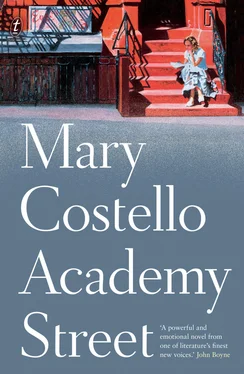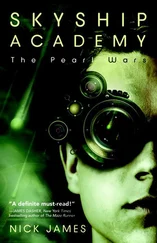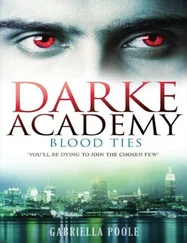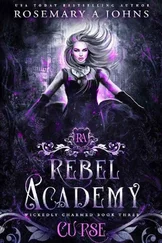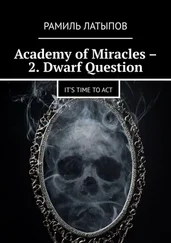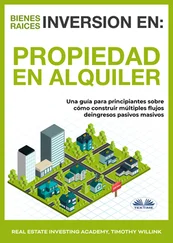Mary Costello - Academy Street
Здесь есть возможность читать онлайн «Mary Costello - Academy Street» весь текст электронной книги совершенно бесплатно (целиком полную версию без сокращений). В некоторых случаях можно слушать аудио, скачать через торрент в формате fb2 и присутствует краткое содержание. Год выпуска: 2014, Издательство: Text Publishing Company, Жанр: Современная проза, на английском языке. Описание произведения, (предисловие) а так же отзывы посетителей доступны на портале библиотеки ЛибКат.
- Название:Academy Street
- Автор:
- Издательство:Text Publishing Company
- Жанр:
- Год:2014
- ISBN:нет данных
- Рейтинг книги:3 / 5. Голосов: 1
-
Избранное:Добавить в избранное
- Отзывы:
-
Ваша оценка:
- 60
- 1
- 2
- 3
- 4
- 5
Academy Street: краткое содержание, описание и аннотация
Предлагаем к чтению аннотацию, описание, краткое содержание или предисловие (зависит от того, что написал сам автор книги «Academy Street»). Если вы не нашли необходимую информацию о книге — напишите в комментариях, мы постараемся отыскать её.
J.M. Coetzee
Academy Street This is an intimate story about unexpected gifts and unbearable losses, and the perpetual ache for belonging. It is exquisitely written and profoundly moving.
Academy Street — читать онлайн бесплатно полную книгу (весь текст) целиком
Ниже представлен текст книги, разбитый по страницам. Система сохранения места последней прочитанной страницы, позволяет с удобством читать онлайн бесплатно книгу «Academy Street», без необходимости каждый раз заново искать на чём Вы остановились. Поставьте закладку, и сможете в любой момент перейти на страницу, на которой закончили чтение.
Интервал:
Закладка:
The young woman moved away from Peter, drifted in and out of other groups, touching men’s arms. Claire came out and stood with Tess, smiling. She seemed smaller, thinner. Then her eyes moved off and her smile waned. Tess turned and watched Peter stride across the yard and in one swift wordless movement he picked up the young woman and threw her in the pool.
In the city she felt the stir of anxiety on the streets, and day by day it entered her. On the TV, missiles, warheads, ships steaming towards Cuba. The end of the world. Fritz sat quiet and sombre. In the mornings she felt the foreboding, the impending doom, gigantic explosions and firestorms flashing across her mind. She thought of home, her father, Evelyn in a houseful of kids, danger floating close. No one was safe. One day she saw a rich woman emerge from a building, usher children into a taxi. Everywhere an exodus, people holding their breaths, looking at one another. As if we are all brothers and sisters, Tess thought. One night the president addressed the nation. She was mesmerised by his beauty, his pain, as if the words themselves afflicted him. Thank you and good night.
And then the ships turned back. We were all brought together in fear and mutual need , she wrote to her father, and now its passing has brought something else — hope, love — down on the streets. She had found a new language — this country had given her new ways to think and speak. One Saturday afternoon Fritz took her up to Loew’s Paradise Theatre in the Bronx. In the foyer was a fountain of Italian marble and, all over the walls, murals and hanging vines. In the dark theatre she sat deep in a velvet seat and when she looked up there was a moonlit sky above her, and stars twinkling and clouds passing by. A week later she returned to the Bronx and bought five dresses in a dress store, one lovelier than the other, because she could. She took the subway back down to 181st Street and walked out into the autumn sun and floated along the sidewalk, catching herself for a moment in that concentrated life.
6
MONTH BY MONTH in that first year Tess discovered a rhythm to her life in the city. The early-morning rise, the subway ride downtown, the day spent among patients and colleagues on the ward. On Sundays when she was off duty she went to Mass with her aunt Molly at the chapel of St Elizabeth’s Hospital. On other days she went to the library on West 179th Street and browsed the bookshelves and sat at a table reading. She came to understand that she could live almost anywhere, so long as there was someone of hers — her own kin — there. Claire had moved to San Francisco earlier in the year. Still, she is in the country, she thought, she is in the same land.
Occasionally, she went shopping or up to a céilí in Gaelic Park in the Bronx with other Irish nurses. She longed to give herself up to their good cheer and lightness. Being among people left her feeling lonely, even, at times, endangered. She felt divided from others. Their talk, their dreams, seemed to her incidental, artificial, something that had to be got through en route to the real conversation, the heart of the matter. She found herself waiting for someone who shared her sensations. One day, at a patient’s bedside, at a tender moment approaching death, she looked into the attending physician’s eyes and he looked into hers and she felt an affinity with him. It was this she craved. She had had intimations of it in books. Perhaps such things, even such people, existed only in books. She was reading Doctor Zhivago then. She sat in a corner of the cafeteria at lunchtime, transported. She was Lara in the battlefield hospital. She was lost to Yuri. She journeyed in the snow, felt their grief. Sometimes she cried. The feelings called to mind moments from childhood, when she was distant from herself but experienced the same peace, as if she were entering another dimension, one which contained the answer to a question she could not yet form. She looked up from her book. Though she felt sure it existed she was not sure such knowledge could be attained or recovered. Or at least not by her. She did not even know what the question was, aware only of vague intimations. Such knowledge was beyond her, requiring more intelligence or learning, or a higher faculty of feeling, than she possessed. At this realisation she grew dispirited. She rose from the table and went down in the elevator and returned to the bustle of the ward, to the clanking of trolleys and bedpans and the humming of machines.
∼
In early spring she transferred to the 168th Street campus of the hospital and to the private wing, the Harkness Pavilion. There she befriended another Irish nurse, Anne Beckett from Wexford, who had come out several years before and was now engaged to be married. Together they went to the St Patrick’s Day Parade on Fifth Avenue and just before Easter they rented an apartment, a fifth-floor walk-up, at 471 Academy Street in Inwood. It was unfurnished except for a single bed in each bedroom. They bought a table, four chairs and a sofa from a couple upstairs. They bought delph and pots and pans, and brightly coloured curtains for the bedrooms. They shared evening meals at the kitchen table and Anne told her about the movie stars and singers who had been patients. Marilyn Monroe had been in the psychiatric wing, though Anne had not nursed her. She had nursed Elizabeth Taylor and Mrs Roosevelt and Cole Porter, who had a wooden leg that he named Geraldine.
Tess wrote to Oliver. Oh, Oliver, you have to come out. There’s room now at Aunt Molly’s. I think about you and Denis and Dadda a lot. And Dadda’s terrible moods, and his silence. I doubt he will ever change. Maybe Easterfield does that, makes everyone silent. There’s nothing for you there, Oliver. You can be anyone here. Anything you dream of. How is Denis? Poor Denis…I miss you all. I dreamt of Mike Connolly the other night. He was standing by the old well in the yard. Do you remember that time Dadda sank the pump, Oliver? Denis climbed down for a sample and Mike held the rope…
∼
One Sunday morning in May she woke to the sound of talk and laughter in the kitchen. Anne had come off night duty and Tim, her fiancé, was there, and Anne’s brother and other boys who had recently come out from Ireland. They were frying eggs and waffles. When she entered the kitchen and saw them around the table she was reminded of summer evenings in Easterfield long ago when the tea was being readied and the wireless was on, before the silence took hold. The radio was on now too, the baseball scores being read in a beautiful melliferous voice, but they were hardly listening, full of their own talk. Their familiar accents pleased her. A shy boy from Kerry got up and gave her his chair, moved away with his plate of eggs. She looked around at their open happy faces and sat among them.
Later they left for the park, urging her to follow. She sat among the dishes, the day stretching before her. She looked at the egg stains on the plates, the empty mugs, the chairs pushed back. Something of the others still drifted there. The sun shone in the window and fell on the pot of marmalade, on the chunky orange peel inside.
She walked the few blocks to Broadway. Up ahead she saw the trees of Inwood Hill Park. She turned left, entered the library at Broadway and Dyckman, its hush and concentrated silence bringing contentment. On a table a large art book lay open. She turned the pages, dazzled by the colours, the yellows and oranges and blues, their intensity. A street café at night. A strange simple bedroom that exerted a lure, a childish longing. A cornfield with crows that made her heart collapse. She stared at the field and the crows, sad and familiar. She began to read. The artist had cut off his own ear, died by his own hand. She turned each page. Letters to his brother. The kindness of Theo moved her. And the life, the words…
Читать дальшеИнтервал:
Закладка:
Похожие книги на «Academy Street»
Представляем Вашему вниманию похожие книги на «Academy Street» списком для выбора. Мы отобрали схожую по названию и смыслу литературу в надежде предоставить читателям больше вариантов отыскать новые, интересные, ещё непрочитанные произведения.
Обсуждение, отзывы о книге «Academy Street» и просто собственные мнения читателей. Оставьте ваши комментарии, напишите, что Вы думаете о произведении, его смысле или главных героях. Укажите что конкретно понравилось, а что нет, и почему Вы так считаете.
